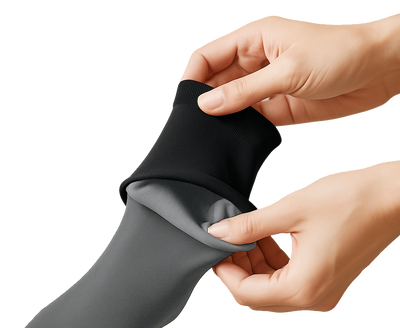Pregnancy and Edema

There is nothing more beautiful than carrying a child. Pregnancy is a wonderful state that gives an even more wonderful gift. But it is not a secret that pregnancy is tough and that it comes with a lot of hard experiences. Sudden and fast changes in a woman’s body affect her overall state, cause problems, and harden the everyday life.
The most common problems that women experience during pregnancy are cramps, muscle aches, varicose veins, swollen feet, edema, constipation, urinary infections, etc. The one problem we will address in this article is edema. Why? Because there are ways of dealing with it, and we have them.
Edema in legs is a common health problem, especially in pregnancy. It is an unpleasant and hard problem that affects the quality of everyday life. Luckily, it can be treated, reduced, and taken under control. As we said, pregnancy carries a lot of health issues with it, and it can be a hard time for some women. So, if you can treat or avoid some of these problems and make the pregnancy as easy as possible, why wouldn’t you?
So, let’s master the problem of edema in pregnancy and learn how to fight it!
What is edema?
Edema is swelling that is caused by excessive fluid in an organ or a tissue. This excessive fluid comes from small blood vessels leakage into a tissue or organ. The fluid builds up over time causing swelling.

There are many types of edema, including lymphedema that comes from damaged lymph nodes after injuries or diseases, and pedal edema that occurs in feet and legs (most common in pregnancy).
Edema is a body’s normal response to injuries or skin infections, but it can also be a sign of other problems such as circulatory system problems or kidney disease.
However, leg edema in pregnancy is a common problem, and if it is light or mild, it can be treated with essential oil or compression socks.
What causes edema during pregnancy?
Edema in pregnancy occurs because of the pressure of your uterus on the vena cava (a vein that is responsible for returning blood to your heart from the lower limbs) and the pelvic veins. This is when bodily fluid increase and collect in the tissue around your feet, arms, and ankles causing swelling.
Edema in pregnancy occurs somewhere between the 20th and 30th week of pregnancy and mostly lasts until you give birth. As we said, it is a normal thing usually without future consequences, but it can be irritating. Not fitting in your shoes or feeling like your feet are sore or heavy can be annoying. The good thing is that there are ways of reducing these symptoms and feeling less “big” and swollen.
Is edema dangerous in pregnancy?
Mild edema in pregnancy is nothing to worry about and is a normal side-effect of pregnancy. Edema affects the majority of pregnant women, but also the majority doesn’t have bigger problems with it. If the swelling, however, feels excessive and doesn’t reduce at all in the period of 24h or longer, it can be a sign of preeclampsia. Preeclampsia, however, is visible in blood and urine tests, so your gynecologist will see it no time.
Edema in pregnancy is a usual occurrence and it rarely becomes an ongoing problem. So, don’t sweat about it. If it bothers you, treat yourself with a pair of compression socks. You will see the swelling reduce and you may even fit in those fancy tight shoes!
How to prevent edema during pregnancy?
Preventing edema in pregnancy is not impossible. You just need to listen to your body, not force yourself more than you need, rest and don’t forget about your feet.

These are some of the things you can do to avoid the swelling:
- Elevate your feet as much as possible. Lay down and lift your legs when resting rather than sitting and putting pressure on them.
- Avoid socks with tight seams. Choose more loose ones, or compression and diabetic socks that don’t restrict the blood flow.
- Wear comfy shoes whenever you can. Choose flexible soles meant for sports.
- Wear compression socks during the day. The compression will help blood circulate, prevent swelling, and lift the pressure of your feet.
- Don’t forget to drink water.
- Try not to sit or stand for a long time, take breaks while walking and lift your legs. Don’t be inactive, just don’t force yourself and take your time.
- Do exercises. There are plenty of pregnancy-friendly exercises you can find on YouTube. Being active will make your pregnancy easier in every aspect.
How to treat edema in pregnancy?
To treat edema in pregnancy you should stick to all the suggestions given to avoid edema. If those don’t help, a massage, chiropractic, or acupuncture could come in hand.
Another popular thing for treating edema in feet is essential oils. The best ones are lavender, juniper, rosemary, chamomile, etc. Mixing a couple of drops with a base oil such as jojoba or almond oil and massaging it into your feet and around ankles can have relaxing abilities, reduce pain, discomfort and swelling.
However, if you are searching for a long-term solution that can help you even after problems with edema, you should look into compression garments.
How to reduce edema in feet during pregnancy?
A good balance between essential oils, compression socks, and thinking about your comfort can do miracles.
Compression garments can help fight edema and swelling, so thinking about those is a good idea. Compression fabrics imitate elevating your feet and improve circulation. Massaging properties promote healthy blood flow and reduce feet discomfort.
Compression socks are true fighters when it comes to swollen feet, circulation problems, and leg pressure. Wearing compression socks will help you drastically. Compression material squeezes the swollen areas and thus reduces the fluid.
How do compression socks help edema?
Compression socks are specially designed to help blood flow and to provide comfort. They belong to a group of garments made of medical-grade materials that fit firmly onto the skin. The main purpose of compression socks is to improve blood circulation, but also to reduce swelling, discomfort, to absorb excess moisture, and to prevent injuries.

Compression prevents the detention of blood in your feet and helps it stay in motion. You have probably heard how good elevating the feet can be for the heart and circulation. Sadly, a few have the opportunity during the day to do this, and we often forget about it during our bedtime.
During pregnancy, feet elevation is even more important because of the pressure that uterus makes on vena cava, a vein that helps blood come back from legs to the heart.
This is why medical-grade compression socks for pregnancy edema are the best call. Feet suffer in this condition, especially if a woman gains sudden weight or carries twins. Capillaries and veins on legs suffer under the pressure. They also fight varicose veins, which can occur in pregnancy as well.
How long to wear compression socks?
There are no reasons for you to limit wearing compression socks because they help raise your overall feet comfort. You should wear them daily if you are able to, or at least once in two days if you own only one pair. You should wash them after every use, so it is useful to have a few pairs you can switch up.
The best time to wear compression socks for pregnancy edema is during the day, whenever you are not elevating your legs. There is no need to wear them during the night, as your feet are in a straight position to your body. Take that time to hand wash them and dry them in the air for the morning.
You should put on compression socks immediately after you wake up and before you jump out of the bed. That way the swelling may not even develop, and blood flow will be balanced from the beginning since it will recuperate during the night.
With light or mild compression, it is safe even to sleep in them, so if you feel like your swelling doesn’t go away during the night, you can put them on.
A pair of compression socks usually last 3-6 months, then they need to be changed for a new pair for maximum comfort.
Even if you stop feeling any leg or circulation related symptoms, continuing wearing compression socks will still be beneficial for you.
Once you give birth, you will most likely take long walks with your child, carry it, and you will probably sleep lighter. These all can cause discomfort on your feet. There are only benefits of wearing compression socks, so there is no reason to give up on them once you feel okay.
Also, they provide prevention for future problems that people experience in their later years.



